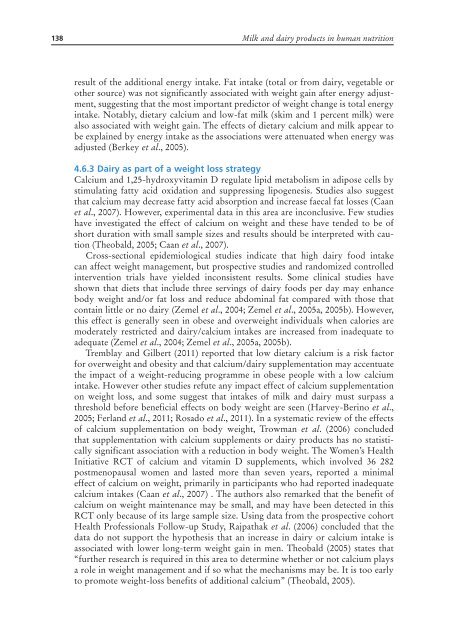Milk-and-Dairy-Products-in-Human-Nutrition-FAO
Milk-and-Dairy-Products-in-Human-Nutrition-FAO
Milk-and-Dairy-Products-in-Human-Nutrition-FAO
Create successful ePaper yourself
Turn your PDF publications into a flip-book with our unique Google optimized e-Paper software.
138<br />
<strong>Milk</strong> <strong>and</strong> dairy products <strong>in</strong> human nutrition<br />
result of the additional energy <strong>in</strong>take. Fat <strong>in</strong>take (total or from dairy, vegetable or<br />
other source) was not significantly associated with weight ga<strong>in</strong> after energy adjustment,<br />
suggest<strong>in</strong>g that the most important predictor of weight change is total energy<br />
<strong>in</strong>take. Notably, dietary calcium <strong>and</strong> low-fat milk (skim <strong>and</strong> 1 percent milk) were<br />
also associated with weight ga<strong>in</strong>. The effects of dietary calcium <strong>and</strong> milk appear to<br />
be expla<strong>in</strong>ed by energy <strong>in</strong>take as the associations were attenuated when energy was<br />
adjusted (Berkey et al., 2005).<br />
4.6.3 <strong>Dairy</strong> as part of a weight loss strategy<br />
Calcium <strong>and</strong> 1,25-hydroxyvitam<strong>in</strong> D regulate lipid metabolism <strong>in</strong> adipose cells by<br />
stimulat<strong>in</strong>g fatty acid oxidation <strong>and</strong> suppress<strong>in</strong>g lipogenesis. Studies also suggest<br />
that calcium may decrease fatty acid absorption <strong>and</strong> <strong>in</strong>crease faecal fat losses (Caan<br />
et al., 2007). However, experimental data <strong>in</strong> this area are <strong>in</strong>conclusive. Few studies<br />
have <strong>in</strong>vestigated the effect of calcium on weight <strong>and</strong> these have tended to be of<br />
short duration with small sample sizes <strong>and</strong> results should be <strong>in</strong>terpreted with caution<br />
(Theobald, 2005; Caan et al., 2007).<br />
Cross-sectional epidemiological studies <strong>in</strong>dicate that high dairy food <strong>in</strong>take<br />
can affect weight management, but prospective studies <strong>and</strong> r<strong>and</strong>omized controlled<br />
<strong>in</strong>tervention trials have yielded <strong>in</strong>consistent results. Some cl<strong>in</strong>ical studies have<br />
shown that diets that <strong>in</strong>clude three serv<strong>in</strong>gs of dairy foods per day may enhance<br />
body weight <strong>and</strong>/or fat loss <strong>and</strong> reduce abdom<strong>in</strong>al fat compared with those that<br />
conta<strong>in</strong> little or no dairy (Zemel et al., 2004; Zemel et al., 2005a, 2005b). However,<br />
this effect is generally seen <strong>in</strong> obese <strong>and</strong> overweight <strong>in</strong>dividuals when calories are<br />
moderately restricted <strong>and</strong> dairy/calcium <strong>in</strong>takes are <strong>in</strong>creased from <strong>in</strong>adequate to<br />
adequate (Zemel et al., 2004; Zemel et al., 2005a, 2005b).<br />
Tremblay <strong>and</strong> Gilbert (2011) reported that low dietary calcium is a risk factor<br />
for overweight <strong>and</strong> obesity <strong>and</strong> that calcium/dairy supplementation may accentuate<br />
the impact of a weight-reduc<strong>in</strong>g programme <strong>in</strong> obese people with a low calcium<br />
<strong>in</strong>take. However other studies refute any impact effect of calcium supplementation<br />
on weight loss, <strong>and</strong> some suggest that <strong>in</strong>takes of milk <strong>and</strong> dairy must surpass a<br />
threshold before beneficial effects on body weight are seen (Harvey-Ber<strong>in</strong>o et al.,<br />
2005; Ferl<strong>and</strong> et al., 2011; Rosado et al., 2011). In a systematic review of the effects<br />
of calcium supplementation on body weight, Trowman et al. (2006) concluded<br />
that supplementation with calcium supplements or dairy products has no statistically<br />
significant association with a reduction <strong>in</strong> body weight. The Women’s Health<br />
Initiative RCT of calcium <strong>and</strong> vitam<strong>in</strong> D supplements, which <strong>in</strong>volved 36 282<br />
postmenopausal women <strong>and</strong> lasted more than seven years, reported a m<strong>in</strong>imal<br />
effect of calcium on weight, primarily <strong>in</strong> participants who had reported <strong>in</strong>adequate<br />
calcium <strong>in</strong>takes (Caan et al., 2007) . The authors also remarked that the benefit of<br />
calcium on weight ma<strong>in</strong>tenance may be small, <strong>and</strong> may have been detected <strong>in</strong> this<br />
RCT only because of its large sample size. Us<strong>in</strong>g data from the prospective cohort<br />
Health Professionals Follow-up Study, Rajpathak et al. (2006) concluded that the<br />
data do not support the hypothesis that an <strong>in</strong>crease <strong>in</strong> dairy or calcium <strong>in</strong>take is<br />
associated with lower long-term weight ga<strong>in</strong> <strong>in</strong> men. Theobald (2005) states that<br />
“further research is required <strong>in</strong> this area to determ<strong>in</strong>e whether or not calcium plays<br />
a role <strong>in</strong> weight management <strong>and</strong> if so what the mechanisms may be. It is too early<br />
to promote weight-loss benefits of additional calcium” (Theobald, 2005).


